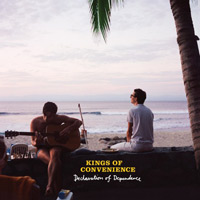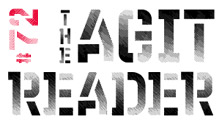
Phrazes for the Young
RCA
For better or worse, the arrival of First Impressions of Earth, the Strokes’ third and most lackluster album, signaled the moment the group would splinter and explore separate paths. While each member trickled out side-projects smelling of a distinct sub-Stroksian stench, the mythologies involved in living the semi-charmed life of a Stroke proved more interesting. With the sudden arrival of a solo album from the band’s primary songwriter and figurehead, Julian Casablancas, the drama has only increased, in part because Phrazes for the Young would have been a perfectly suitable substitute for a Strokes’ album, and if the rumors are true, there may never be another Strokes album.
Fear not, though Phrazes is nettled with one obvious disaster (the overwrought “River of Brakelights”), it’s collectively a better record than First Impressions, or for that matter any other “solo” record churned out in recent years. Like the lead track “Out of the Blue,” which itself is “Last Night” circa 2012, Phrazes plays out as the logical evolution of the Strokes’ infinite and scruffy jangle. The air of privilege is thick and found in a giddy excessiveness that could make the Electric Light Orchestra cower in fear. “Tourist” is a perfectly ripe example of Casablancas’ carnival in sound, with chutes and ladders of slinky trap-set beats, Wakemen-sized synth passages, and a detour down an alley in Tijuana where the regal mariachis show up to lend a hand. It’s easy to imagine the kid behind the controls in this attempt to make a labyrinth of “introspective” complexity and a vivid glimpse of our musical future, as if to say, “My first band changed things when I was 21. Watch me do it again at 31.” Maybe he’s fooled himself out of the realization that it has always been his stoner aloofness that was the calling card of the Strokes, not grandiose statements on love and death. “11th Dimension” is not a single of genius in bloom; it’s purely fun, privileged permagrin, sugary as fuck, and still slurred-out with the same casual cool as before, only now it’s fortified with the glow of a million neon signs at a Tokyo intersection.
“Ludlow St.” may be the best summation of where Casablancas, as the street urchin, thrusts that character into a sort of coming of age experience. Here he’s got a lot of dialogue—lamenting on the mistakes of his twenties, the gentrification of the old ’hood—but matches it with banjo solos, hawkish arrangements, and candy-coated moxie. It’s a balance wholly likable and catchy beyond critique. Even when “Chords of the Apocalypse” gets dangerously close to a campy showtune, his mumbled indifference shines through.
Kevin J. Elliott

Turning the Mind
Mute
With 2007’s We Can Create, James Chapman (a.k.a. Maps) accomplished the rare feat of creating a record by electronic means that was as emotive as it was modern. At sea in a swirling, insular world of cascading sounds, Chapman found its sentient center, a core of small gestures and subtlety that eclipsed the record’s more elaborate decoupage. It would certainly be a hard act to follow. (The album was shortlisted for a Mercury Prize in England.)
Turning the Mind is that follow-up, and it finds Chapman clearing away the haze from the decks. He hasn’t necessarily charted a new course, but there is clearly a new aesthetic piloting the album. Instead of the glazed tones that dominated We Can Create, he’s taken to more “natural” sounding synths, that is synths that sound like synths. On the opening title track, he strikes a Moroder motif, lending the cut a post-disco vibe. The remainder of Turning’s dozen songs are similarly time-stamped, effectively setting the record in some past life just as Chapman deals with his current travails. On “Let Go of the Fear,” he’s stuck in the ’90s with a bad techno thump, while the brooding effervescence of “Papercuts” is more reminiscent of a decade earlier. It’s only when he succeeds in transcending such retrofitting that the record escapes this sense of ephemeralness, as on the sparkling light-and-dark dichotomy of “I Dream of Crystal” and the bouncy simplicity of “Die Happy, Die Smiling.” But where Maps once wasn’t afraid to let his songs have their way, here he lets them fall prey to certain trappings, boxing himself in in the process.
Stephen Slaybaugh

Songs About People I Know
The Kora
Even after four subsequent listens through Stricken City’s debut album, Songs About People I Know, it’s incredibly hard to gauge whether the quartet is on the verge of becoming the next big, bloody British band of the moment or if they’re as lukewarm as they come without any discernable melodies to hold one’s interest. Many times in the Kingdom’s market those qualities are one in the same. Perhaps the confusion stems from being unable to codify Stricken City’s sound in a tidy series of flowery descriptors and influences. There’s a refreshing eclecticism to a song as ambling as “Small Things” that the Sugarcubes are the only band that comes to mind—and Rebekah Raa’s all-over-the-map vocal rasp bears no resemblance to that of Björk. Iain Pettifer’s guitars also run the gamut, picking through riffs as diverse as the proto-twee of Josef K and Johnny Marr, as well as more atonal, albeit softer, versions of post-rock clatter.
Though Stricken City tend to have a hard time pinning themselves to one lapel on Songs, most misfires can be chalked up to rookie mistake, as they have several irresistible singles littered among the filler: “Pull the House Down,” a tropically limbed cousin to some classic Sarah 45, “Tak O Tak,” an effervescent synth-angled anthem not unlike Love is All, and the best of the bunch, “5 Meters Apart,” which is pure unadulterated Jam worship for modern co-eds. There’s nothing stale here, so even when reduced to an a capella moment in transit, as on “Gifted,” or the overly dramatic piano-led finale in “Terrible Things,” Stricken City show a refusal to follow their peers that doesn’t come across as elitist and a dedication to their elders that doesn’t sound rehashed. Originality, especially in a sea of similarly sharp-tongued blokes, is a difficult goal to reach for these days, but Stricken City show it in style and substance.
Kevin J. Elliott

Exploding Head
Mute
During the 1994 talent show at my high school, when one of the teenage bands attempted a feedback solo, the curtains were promptly drawn. The stage managers gave them the equivalent of the old vaudeville cane, erroneously thinking they were saving these kids from technical chaos. The audience was left confused—perhaps the sleepy suburbs weren’t quite ready. But if in 2009, Brooklyn’s A Place to Bury Strangers has audiences wondering, “What is this?”—it’s in a good way, usually resulting in wanting more of the band’s moody, feedback-heavy, melodic wall of sound. Singer and guitarist Oliver Ackerman’s also made a name for himself with Death by Audio, his custom effects business that sells equipment to bands that include U2, TV on the Radio and main point of reference, My Bloody Valentine.
For the follow-up to 2007’s self-titled release, Exploding Head, Ackerman has said that he and bassist Jono MOFO and drummer Jay Space set out “to create the craziest, most fucked-up recording ever.” While perhaps not the craziest thing ever recorded, the band has created an interesting record that is both strange, yet accessible. The obvious comparison is the Jesus and Mary Chain, whose pop-and-distortion mix seems to inform “I Lived My Life to Stand in the Shadow of Your Heart” and “Smile When You Smile.” Still the title track also bears elements of Seventeen Seconds–era Cure, while the smoky pop flavored of “In Your Heart” adds a slight twinge of Psychedelic Furs.
But comparisons aside, there’s a brute force to songs such as “Everything Goes Wrong” that defies analogies. The overall effect may be about as subtle as a sledgehammer, but still it’s clear that the details are what’s important, be it the frenetic energy on “It Is Nothing” or the B-movie horror riff that “Dead Beat” is built upon. Whatever it is, the appeal of A Place to Bury Strangers is immediate.
Josie Rubio
MP3: “In Your Heart”

Inspiration Information
Strut
Fela Kuti is universally acknowledged as the creator of Afro-beat, but not as much attention is paid to the man who actually provided that beat, his longtime drummer Tony Allen. Over the course of 30 albums Allen’s distinctive drumming style gave the genre its signature rhythm and sonic stamp. After leaving Kuti’s Africa 70, he formed his own band and has managed to stay active. Mostly remaining a behind-the-scenes presence, he has nonetheless tackled higher profile gigs such as his membership in the Damon Albarn supergroup The Good, The Bad & The Queen. And while Allen may not get as many props as he might deserve, Brian Eno has referred to him as “perhaps the greatest drummer who has ever lived.”
So it’s fitting that as part of Strut Records’ ongoing series of Inspiration Information records that pair artists with their heroes, Allen is paired with a similarly below the radar artist, Finnish musician Jimi Tenor. Tenor came to popular notice in the early ’90s, labeled as a purveyor of “mutant techno jazz.” But he turned out to be more than just that evocative but meaningless label. Not really a dance artist, Tenor has leaned more towards the downtempo and jazzier side of things. It makes sense that he and Allen would be paired together as both men seem to be inspired by jazz, but give it their own twist.
The potential problems with these type of albums are paling in comparison to the artists’ best work or everyone being afraid to challenge each other and the result ending up a tasteful but bloodless outing. Thankfully Inspiration Information neatly sidesteps those problems. The result is an album that is definitely informed by Afro-beat, from the use of humor to cushion some of the political content to Tenor’s sax playing which does suggest some of Kuti’s styling. There’s not a lot that’s new, but it does showcase a lot of smart and interesting playing from everyone involved. There’s a certain subtlety in Allen’s drumming that is deceptive in initial listening, and while he is the star of the album, his contributions are in the forefront of the mix. As a result, it might be easy to miss that he’s actually playing really complex ideas.
With the current re-examination of Fela Kuti’s musical legacy, Inspiration Information comes out at the perfect time to discover (or rediscover) a man’s who helped change the music world.
Dorian S. Ham
MP3: “Selfish Gene”

Declaration of Dependence
Astralwerks
It’s been five years since the Kings of Convenience’s last record, Riot on an Empty Street (and before that, there was a span of three years between albums), and where the Norwegian duo was once heralded as the leaders of a new school of thought whose mantra was “quiet is the new loud” (after the Kings’ proper debut album), that notion somehow seems antiquated now. It’s not so much that their ship has sailed, but that their hushed cadence is less pleasantly jarring.
One might think too that there is only so much that can be done with a couple of nylon-stringed acoustics and two voices, but the Kings already dispelled that idea with Riot, whose syncopated rhythms and mix of João Gilberto and Nick Drake influence elevated the band to a new gossamer level. So the ambivalence that Declaration of Dependence evokes is somewhat hard to decipher. Promising at first, with a harp-like guitar refrain giving “24-25” a distinctive lilt and a quick rhythm lifting “Me in You,” the album nonetheless soon falters. Where once the Kings’ soft styling was an unaffected antidote to the bombast of so much other music, on the great majority of the record it seems redundant and, at times, even mundane. Part of the problem is the production at work, additional reverb muffling some of their crystalline guitar interplay. But deeper still, at the root, is a lack of direction, songs like “Second to Numb” making the same turns, and thus going in circles. It’s like they began without knowing where they were going, only to wind up in the same place as they started nevertheless.
Stephen Slaybaugh
ALBUM REVIEWS
Beaten Awake, Thunder$troke
Dead Man's Bones, Dead Man's Bones
Florence + the Machine, Lungs
Flight of the Conchords, I Told You I Was Freaky
Atlas Sound, Logos
The Slits, Trapped Animal
Little Girls, Concepts
Fuck Buttons, Tarot Sport
Themselves, CrownsDown
Lightning Bolt, Earthly Delights
Air, Love 2
Antipop Consortium, Fluorescent Black
Neon Indian, Psychic Chasms
Bell Horses, This Loves Last Time
